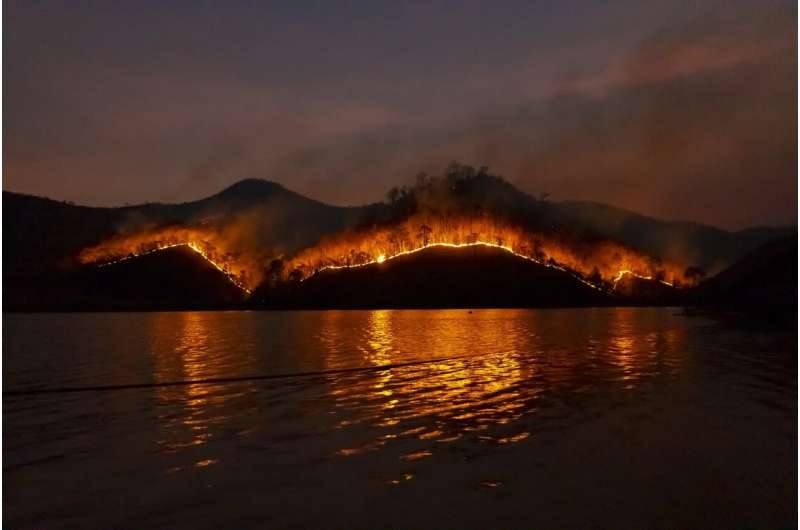Maui wildfires: Extra logistical challenges hinder government's initial response when disasters strike islands

Wildfires destroyed the Hawaiian tourist town of Lahaina on Aug. 8 and 9, 2023, leaving many of its . Fires also , Hawaii's second-largest island, and its . President Joe Biden , which authorizes federal aid for communities in harm's way.
The Conversation asked Ivis GarcÃa, an in Puerto Rico, to explain how the U.S. government responds to disasters like these and how Maui's geography could interfere with aid delivery.
Is it harder for aid to reach an island than the US mainland?
The , which delivers emergency assistance after disasters, has to deal with big transportation challenges in cases like this. Initially, FEMA will be focused on bringing food, generators, cots, meals and anything else people need, and that aid will be arriving on planes and boats rather than by road.
Later, FEMA might bring temporary homes—often called trailers—but only if there's enough suitable land to accommodate them. There were not a lot of FEMA-supplied trailers in Puerto Rico after Hurricane Maria struck in 2017. On islands, like Maui, there's usually not a lot of room to set up trailer parks, whether or not a disaster has just occurred.
Likewise, it will be harder to deploy emergency personnel. Aid workers will have more trouble getting to Maui than they would have arriving in North Carolina, for example. And there could be few places for them to stay. It's not clear if that's going to be a problem on Maui, where there before the wildfires broke out.
Everything about the immediate response to a disaster in places like Hawaii and Puerto Rico is more expensive than on the mainland. That includes food, shelter and transportation. You can't just drive there or go rent a car when you arrive. There's typically little public transportation available, and there are few roads even if an aid worker can obtain a vehicle.
When aid does arrive by boat, unloading it can be hard and take a long time. The disaster may have damaged the local harbors and ports, and the are usually small and not suited for cargo. Reports don't indicate that , was damaged.
than Japan but thousands of miles away from both places. Because of U.S. laws, all . The same is largely true as well for private aid because of the that requires goods shipped between U.S. ports to be transported by vessels that belong to Americans and are primarily U.S.-operated.
The government has the power to issue a waiver of the Jones Act during disasters. Former President , after Hurricane Maria.
Some members of Congress have sought for years to , at least for shipping to remote places like Hawaii, Alaska, Guam and Puerto Rico, without success.
What can Maui residents expect from FEMA?
Residents of a disaster area may qualify for FEMA's —one-time payment that in recent disasters has been for $700.
On top of emergency aid, food and clothing, FEMA will help residents apply for housing aid as needed. FEMA's housing aid ; sometimes provide further funding.
FEMA usually sets up an assistance center for this, often in coordination with local nonprofits. This process could take several months to get underway, and from individuals. In the meantime, displaced residents may get money or vouchers to cover short-term hotel stays.
on Maui, even in normal circumstances. So it's likely that many local residents will find it nearly impossible to cover their short-term housing costs with their FEMA assistance. That means large numbers of displaced people are likely to relocate to another Hawaiian island or another state with cheaper housing and hotels. Most likely, many of them won't return.
That's what happened in Puerto Rico after Hurricane Maria.
Researchers have estimated that of the after Maria, . It's worth noting that regardless of whether one resides in Maui or elsewhere, FEMA only provides .
Residents at that point might be making their own houses habitable again. Often, nonprofits pitch in with this work. If residents were homeowners, rather than renters, and had insurance, they'll eventually get to rebuild or, depending on state laws, relocate.
FEMA's housing aid primarily benefits homeowners, and there's evidence that to get the housing help they need from the agency. Renters sometimes qualify for FEMA grants to cover losses not insured by an insurance policy, such as furniture and other personal belongings.
Renters, business owners, nonprofits and homeowners located in disaster areas can also apply for .
What about tourism?
There were many after Maria. Their hotels were damaged, and they were evacuated, along with local residents, to shelters. That's , with the wildfires.
Once those tourists leave, the hotels damaged by wildfire will need to rebuild before the local tourism industry can recover. Many of the people who work in smaller tourism operations will be busy building their own homes before they can focus again on restoring their businesses.
Larger hotels that were damaged, such as the historic , will probably wait for their insurance policies to pay out before rebuilding.
In Puerto Rico, which like it gets as a popular travel destination, it because the island's .
Provided by The Conversation
This article is republished from under a Creative Commons license. Read the .![]()





















